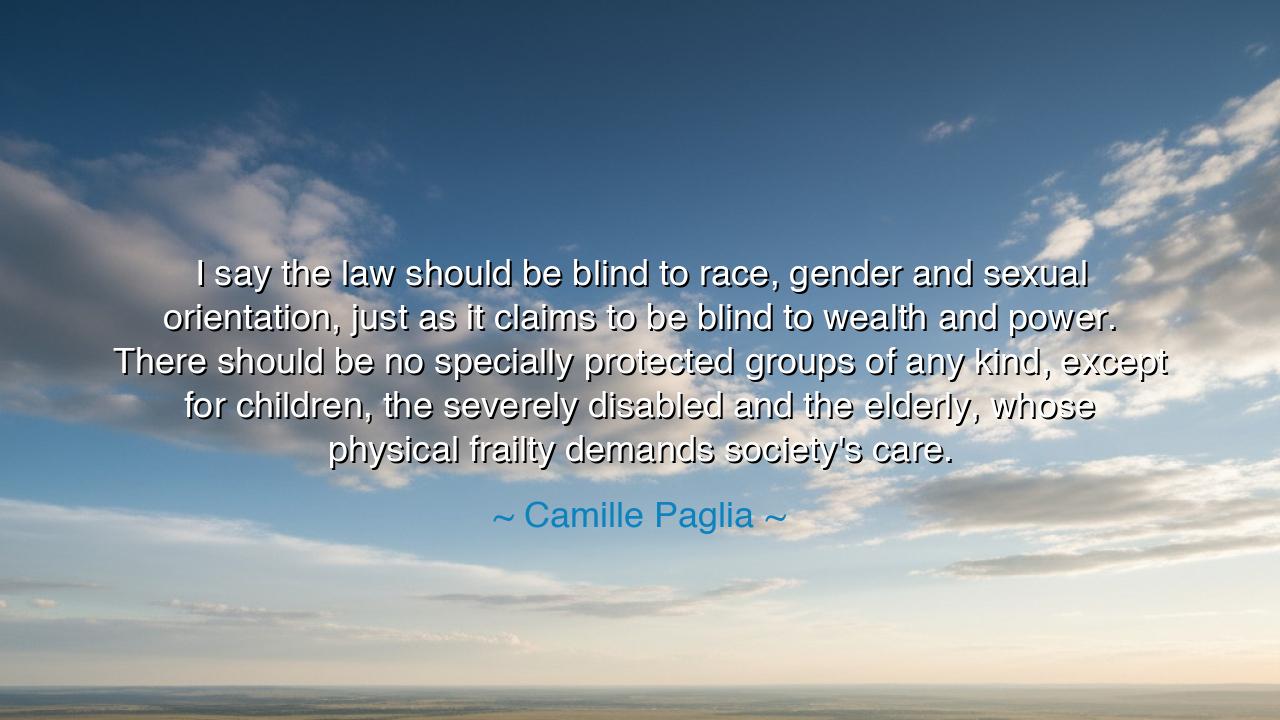
I say the law should be blind to race, gender and sexual
I say the law should be blind to race, gender and sexual orientation, just as it claims to be blind to wealth and power. There should be no specially protected groups of any kind, except for children, the severely disabled and the elderly, whose physical frailty demands society's care.






The words of Camille Paglia, “I say the law should be blind to race, gender and sexual orientation, just as it claims to be blind to wealth and power. There should be no specially protected groups of any kind, except for children, the severely disabled and the elderly, whose physical frailty demands society's care,” resound like the cry of a philosopher standing at the crossroads of justice. They call for a vision of law that is unshaken by favoritism or prejudice, a law that holds every soul equal before its scales. Paglia, ever a voice of provocation and clarity, speaks here of the eternal struggle: to craft a justice that rises above the accidents of birth, beyond wealth, beyond identity, and binds itself only to fairness and truth.
The origin of this saying lies in Paglia’s role as a cultural critic, one who has long challenged orthodoxies of left and right alike. In her writings and lectures, she has demanded that society return to first principles: that equality must mean sameness of law, not the multiplication of special privileges. Her words are not the rejection of compassion, but the defense of a higher standard—one that refuses to carve humanity into groups competing for protection, and instead insists that protection belongs to all by right of being human. Only the most vulnerable—the child, the aged, the disabled—she grants as exceptions, for their frailty makes them unable to defend themselves in the arena of life.
History itself illustrates the truth of her vision. Consider the ancient story of Solon of Athens, who sought to reform the city’s laws in a time of chaos. The nobles demanded privilege, the poor demanded vengeance, and Athens trembled at the brink of ruin. Solon declared that justice must stand above both wealth and birth, and in his reforms he broke the chains of debt slavery and established rights for the many. Though imperfect, his work gave Athens a path toward democracy. His principle was the same as Paglia’s: that law must be blind to power, blind to wealth, blind to the divisions that men so often exalt.
Yet Paglia’s words are not only a call for fairness—they are a warning against excess. For when society begins to multiply “specially protected groups,” it risks undermining its own foundation. Justice, divided into categories, becomes no longer universal but fragmented. Instead of one people under one law, there emerge countless factions, each demanding its own shield. In such a world, unity dissolves, and resentment grows. Paglia’s vision is to prevent this unraveling: to keep justice whole by ensuring its equal application.
The deeper meaning of her saying is that true equality does not consist in privileges or exceptions, but in the same rule applied to all. It is easy for law to claim blindness; harder is the task of truly enforcing it. For even as the law professes impartiality, the reality of wealth and power often bends it. Paglia reminds us that the same blindness demanded for race or gender must also extend to riches and influence, else the law is but a mask worn by injustice. Her words pierce the illusion and demand that we see the contradiction.
The lesson for us is twofold: first, to defend the principle that no person should be exalted or diminished before the law because of identity, status, or birth. Second, to extend special care only where life itself is fragile: the child, who cannot yet defend themselves; the elderly, whose strength has waned; and the disabled, whose bodies bear burdens too heavy to carry alone. In this way, justice and compassion are reconciled, and the law becomes both firm and humane.
Therefore, let us live with vigilance and integrity. Let us demand from our courts and our leaders not favoritism but fairness, not privilege but parity. Let us remember that the greatness of a society is measured not by how it divides its people into groups, but by how it treats them all as equals before justice. And let us extend our protection wisely, remembering always the weak, for their care is the mark of a civilization’s soul.
So let Paglia’s words endure as a teaching for future generations: “The law should be blind.” Blind not in ignorance, but in fairness; blind not to suffering, but to prejudice. Let us build a society where the scales of justice do not tilt toward wealth or identity, but balance evenly, upheld by compassion for the frail and equality for all. In this balance lies the path to true civilization.






AAdministratorAdministrator
Welcome, honored guests. Please leave a comment, we will respond soon